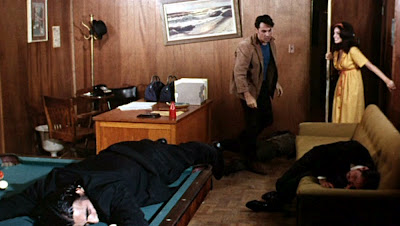health

I stopped shaving. Legs, pits, bits – I ceased cultivation and let them revert to a state of nature. (…) I smell exactly the same as I did before. (…) I have changed the way I dress a little.
{ Vagenda | Continue reading }
photo { Edward Weston, Legs, 1934 | Edward Weston, Charis Wilson, 1934 }
related: Edward Weston, Nudes, Oceano Dunes, 1936:






Although Weston preferred an 8 X 10 camera, he made increasing use while in Mexico of his 3-1/4 X 4-1/4 Graflex - hand held even at exposures as long as 1/10 second. To enlarge these negatives on platinum or palladium paper was tedious. An enlarged negative had to be made. First an 8 X 10 inch glass positive was made from the small negative. From this, in turn, he made a new negative, which he then printed by contact. Apparently he never printed by projection -although it was entirely practical to do so with gelatino-bromide papers which were then readily available. On his return to California he abandoned platinum and palladio papers, and settled on glossy chloro-bromide papers — which he invariably printed by contact.
{ Edward Weston’s Technique | Continue reading }
experience, hair, photogs | April 26th, 2012 7:09 am

Some scientists argue that the purpose of sleep may not be restorative. In fact, they argue that the very question “why do we sleep?” is mistaken, and that the real question should be “why are we awake?” (…)
The world record for going without sleep is eleven days.
{ BBC | Continue reading }
photo { Adrienne Grunwald }
photogs, sleep, theory | April 24th, 2012 12:55 pm

Both scientists and artists have suggested that sleep facilitates creativity, and this idea has received substantial empirical support. In the current study, we investigate whether one can actively enhance the beneficial effect of sleep on creativity by covertly reactivating the creativity task during sleep.
Individuals’ creative performance was compared after three different conditions: sleep-with-conditioned-odor; sleep-with-control-odor; or sleep-with-no-odor. In the evening prior to sleep, all participants were presented with a problem that required a creative solution. In the two odor conditions, a hidden scent-diffuser spread an odor while the problem was presented. In the sleep-with-conditioned-odor condition, task reactivation during sleep was induced by means of the odor that was also presented while participants were informed about the problem. In the sleep-with-control-odor condition, participants were exposed to a different odor during sleep than the one diffused during problem presentation. In the no odor condition, no odor was presented.
After a night of sleep with the conditioned odor, participants were found to be: (i) more creative; and (ii) better able to select their most creative idea than participants who had been exposed to a control odor or no odor while sleeping.
These findings suggest that we do not have to passively wait until we are hit by our creative muse while sleeping. Task reactivation during sleep can actively trigger creativity-related processes during sleep and thereby boost the beneficial effect of sleep on creativity.
{ Journal of Sleep Research/Wiley }
ideas, sleep | April 23rd, 2012 3:56 pm

Women with heart disease are more likely to give birth to female rather than male babies according to a new study.
{ EurekAlert | Continue reading }
health, science | April 20th, 2012 10:23 am

Studies have indicated that redheads may be more sensitive to pain and may need more anesthetics to numb them.
A research published in the Journal of American Dental Association found that painful experiences at the dentist might cause more anxiety for men and women with red hair, who were twice as likely to avoid dental care than people with dark hair.
{ CNN | Continue reading }
hair, health | April 20th, 2012 8:18 am

In an act of transformation worthy of any magician, scientists have converted scar tissue in the hearts of living mice into beating heart cells. If the same trick works in humans (and we’re still several years away from a trial), it could lead us to a long-sought prize of medicine – a way to mend a broken heart.
{ NERS/Discover | Continue reading }
health, science | April 19th, 2012 10:27 am

When it comes to diagnosing depression in teens, differentiating mental illness from normal mood swings can be difficult. But it can be a crucial diagnosis, given that untreated depression in youth makes them more vulnerable to later substance abuse, social maladjustment, physical illness and suicide.
“Depression in adolescents affects basically every component of their thinking and makes everything very difficult psychologically and socially,” says Eva Redei, a professor of psychiatry and behavioral sciences at Northwestern University Feinberg School of Medicine.
Currently, a depression diagnosis in teens relies on their descriptions of symptoms and their physician’s subjective observations. But now a new study suggests there may be a surer, more objective way: a blood test that identifies major depression by looking for a specific set of genetic markers in the blood.
{ Time | Continue reading }
photo { Pina Bausch, Blaubart, 1977 | performance still }
blood, genes, kids | April 18th, 2012 6:12 am

The outbreak of a new livestock disease in western Europe last year, particularly harmful to offspring, could move further into areas surrounding the worst affected countries in the next cycle of new births, scientists say.
Schmallenberg virus - named after the German town where it was first detected in November - infected sheep and cows on at least 2,600 farms in eight EU countries last year, most likely between August and October.
Thought to have been spread for hundreds of miles across Europe by biting midges and warm late summer winds, the virus has since been confirmed in Belgium, the Netherlands, Luxembourg, France, Italy, Spain and Britain.
{ Reuters | Continue reading }
animals, health, uh oh | April 18th, 2012 6:00 am

Waking up from surgery can be disorienting. One minute you’re in an operating room counting backwards from 10, the next you’re in the recovery ward sans appendix, tonsils, or wisdom teeth. And unlike getting up from a good night’s sleep, where you know that you’ve been out for hours, waking from anesthesia feels like hardly any time has passed. Now, thanks to the humble honeybee, scientists are starting to understand this sense of time loss. New research shows that general anesthetics disrupt the social insect’s circadian rhythm, or internal clock, delaying the onset of timed behaviors such as foraging and mucking up their sense of direction. (…)
Warman says his team is currently looking at whether shining bright light at someone under anesthesia—a well known way to alter the circadian clock—could also reduce the procedure’s disorienting effects.
{ Science | Continue reading }
photo { Steve Shapiro, Truman Capote, Kansas, 1967 }
science, sleep, time | April 17th, 2012 10:27 am

Federal authorities have arrested eight men accused of distributing more than $1 million worth of LSD, ecstasy, and other narcotics with an online storefront that used the TOR anonymity service to mask their Internet addresses.
“The Farmer’s Market,” as the online store was called, was like an Amazon for consumers of controlled substances, according to a 66-page indictment unsealed on Monday. It offered online forums, Web-based order forms, customer service, and at least four methods of payment, including PayPal and Western Union. From January 2007 to October 2009, it processed some 5,256 orders valued at $1.04 million. The site catered to about 3,000 customers in 35 countries, including the United States.
To elude law enforcement officers, the operators used software provided by the TOR Project that makes it virtually impossible to track the activities of users’ IP addresses.
{ Ars Technica | Continue reading }
photos { Claes Källarsson | 1 | 2 }
drugs, law, technology | April 17th, 2012 10:25 am

From the mouth and nose, through the pharynx into the trachea, separating into the left and right main bronchi at the larynx. This is the start of your airway. This is to be the site of inflammation, or rather, the site of battle. Across the landscape that is the airways, two sides are about to go to war. Invading pathogens versus human inflammatory cells, in a war that will eventually lead to pneumonia.
{ science left untitled | Continue reading }
health, science | April 16th, 2012 5:49 am

In my new book Drop Dead Healthy, I try to become the healthiest person alive. In doing so, I examine hundreds of activities to determine if they are healthy.
Is meditation healthy? Yes. Petting dogs? Yes, because it lowers the blood pressure. Sitting? Definitely not. Going to a noisy restaurant? No. Taking naps? Thank God yes.
One of the few activities I didn’t discuss: Reading. Is reading healthy? Or will it slowly murder you?
No doubt I’m a bit biased, but I’ve come to the conclusion that overall, books are, in fact, good for your health. (…)
More and more research shows that sitting is bad for you. It significantly increases your chances of heart disease and slows your metabolism.
This is why, for my book, I ignored the siren call of my chair and did a lot of reading standing up. Reading on your feet burns about 34 more calories per hour than reading while sitting. Eventually, I took it further. I bought a treadmill, converted it into a desk, and did all my reading and writing while walking. It took me about a thousand miles to write the book.
{ AJ Jacobs/Omnivoracious | Continue reading }
books, guide, health | April 13th, 2012 6:45 am
health | April 11th, 2012 1:00 pm

A general continuum theory for the distribution of hairs in a bundle is developed, treating individual fibers as elastic filaments with random intrinsic curvatures. Applying this formalism to the iconic problem of the ponytail, the combined effects of bending elasticity, gravity, and orientational disorder are recast as a differential equation for the envelope of the bundle, in which the compressibility enters through an ‘equation of state’. From this, we identify the balance of forces in various regions of the ponytail, extract a remarkably simple equation of state from laboratory measurements of human ponytails, and relate the pressure to the measured random curvatures of individual hairs.
{ arXiv | Continue reading }
painting { Botticelli, Portrait of Simonetta Vespucci, c.1476 }
hair, science | April 9th, 2012 2:11 pm

All natural hair colors are the result of two types of hair pigment. Both of these pigments are melanin types, produced inside the hair follicle and packed into granules found in the fibers.
Eumelanin is the dominant pigment in dark-blond, brown hair, and black hair, while pheomelanin is dominant in red hair.
Blond hair is the result of having little pigmentation in the hair strand.
Gray hair occurs when melanin production decreases or stops.
{ Wikipedia | Continue reading }
photo { Matthew Spiegelman }
colors, hair | April 8th, 2012 5:28 am

Homicidal sleepwalking, also known as homicidal somnambulism, is the act of killing someone during an episode of sleepwalking.
About 68 cases had been reported in the literature up to 2000.
{ Wikipedia | Continue reading }
photo { Anja Niemi }
incidents, sleep | April 6th, 2012 12:42 pm

Multiple viral diseases are spread through vectors, like ticks and mosquitoes, that result in massive health care issues and epidemics worldwide – my question has always been, if the vectors are infected with the virus, are they getting a disease? And, what is in it for the organism? Or, what is driving the vector to spread the viral infection?
George Dimopoulous’ group at Johns Hopkins University shed light on these questions in their latest publication on Dengue virus and the effect on its main vector, mosquito species Aedes aegypti.
{ Smaller Questions | Continue reading }
health, insects, science | April 5th, 2012 12:10 pm

A birthing woman’s average labor time was barely four hours. These days, labor is a six and a half-hour marathon, at least according to a new federal study that compared almost 140,000 births from two different time periods. (…)
While the exact causes of longer labor times are unclear, the study suggests a few contributing factors, such as differences in today’s mothers from the mothers of yesteryear, namely that first-time mothers today are four years older on average, boast higher body masses, and are a more racially diverse group than their 50s-era predecessors. Babies are also bigger today, with the average newborn being 4-ounces heavier at birth than it would have been in 1960.
{ Jezebel | Continue reading }
photo { Erwin Olaf }
health, kids | April 3rd, 2012 7:08 am

A new approach to fMRI scanning offers a three-dimensional look at brain activation.
fMRI is already a 3D technique, of course, but in the case of the cerebral cortex - which is what the great majority of neuroscientists are most interested in - the 3D data are effectively just 2D images folded up in space. (…)
In a new paper, Minnesota neuroscientists Olman et al say that they’ve given fMRI a third dimension.
{ Neuroskeptic | Continue reading }
related { functional MRI (fMRI) is an MRI procedure that measures brain activity by detecting associated changes in blood flow. }
health, neurosciences, technology | March 30th, 2012 1:53 pm

Life on the organ transplant list is miserable. The wait can take years, while you work your way up a list of tens of thousands. Sixty thousand people are on the list for kidneys alone, and the average person will be there for about five years. Because the organs all work together, the failure of one of them can slowly destroy the rest, making the person sicker and sicker as the years stretch out. No one has a guarantee. In the US, about eighteen people die every day waiting for an organ. (…)
So it makes sense that there’s a black market for organs out there.
{ io9 | Continue reading }
economics, health | March 29th, 2012 10:00 am




























